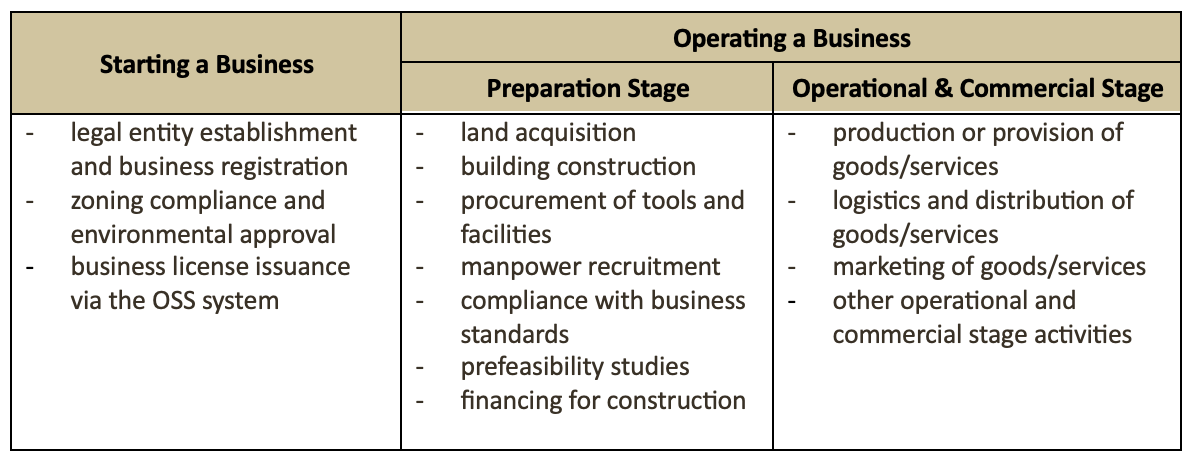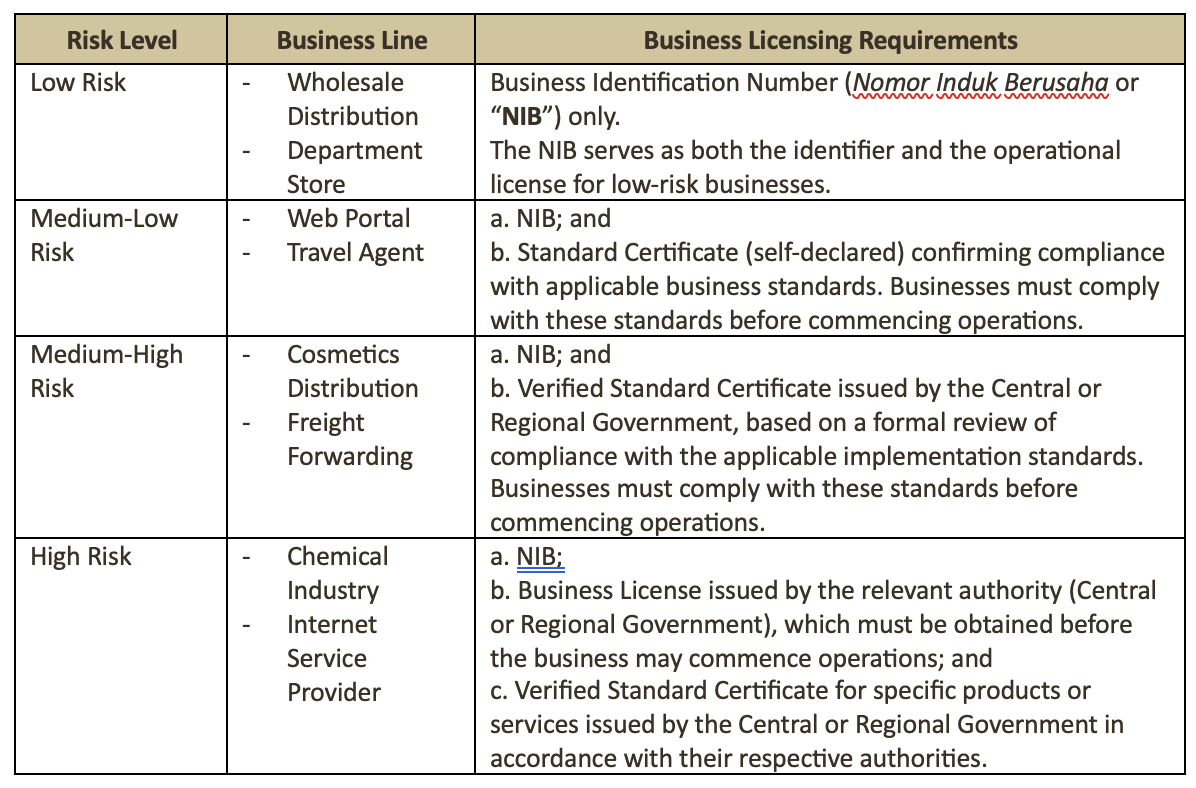On June 5, the Government of Indonesia issued Government Regulation No. 28 of 2025 on the Organization of Risk-Based Business Licensing (“GR 28/2025”), replacing the previous regime under Government Regulation No. 5 of 2021. This new regulation is a part of the government’s broader agenda to simplify and modernize Indonesia’s business licensing framework. It introduces several key changes, including expanded sectoral coverage, streamlined licensing procedures, updated mechanism for environmental approvals, and enhanced post-licensing compliance obligations.
GR 28/2025 also centralizes key licensing functions and reinforces the role of the Online Single Submission (“OSS”) system as the integrated platform for risk-based business licensing. The regulation aims to reduce regulatory overlaps, enhance transparency, and strengthen government oversight throughout the licensing process.
In this newsflash, we will highlight key aspects of Indonesia’s risk-based business licensing framework, explain the main changes introduced under GR 28/2025, and explore the implications for businesses across different sectors.
Indonesia’s Risk-Based Business Licensing Framework
Under GR 28/2025, the business licensing framework is structured into two (2) phases:
(i) starting a business; and
(ii) operating a business.
Each phase involves distinct activities that are subject to licensing requirements tailored to the risk-profile of the business. The framework is intended to provide a clear and structured pathway from initial setup to full commercial operation, while ensuring compliance with applicable zoning, environmental, and business standards.
The table below outlines the typical activities under each phase:

Under this risk-based approach, licensing requirements vary depending on the assessed risk level of the business activity. Risk is defined as “the potential for injury, loss from a hazard, or a combination of the probability and consequence of danger”. The assessment considers factors such as public health, safety, environmental impact, and the use of natural resources.
Based on this analysis, business activities are categorized into four (4) risk levels:
- low risk;
- medium-low risk;
- medium-high risk; and
- high risk.
The table below summarizes the applicable licensing requirements for each risk category, including common examples of business activities associated with each risk level:

Main Changes under GR 28/2025
GR 28/2025 introduces several key revisions to the previous risk-based licensing regime, most notably by expanding the range of regulated sectors. The number of sectors subject to risk-based licensing has increased from 16 to 22, with the inclusion of new additional sectors such as the creative economy, geospatial information, legal metrology, cooperatives, investment, and the operation and implementation of electronic systems.
The licensing process is now fully integrated with the OSS system, which has been enhanced with new subsystems to manage the end-to-end licensing lifecycle, including the processing and issuance of
environmental approvals. These enhancements are intended to support efficiency, transparency, and consistent coordination across ministries and government agencies involved in business licensing.
GR 28/2025 also reflects a significant shift toward centralized authority. Most assessment, verification, and licensing issuance functions have been transferred to the central government level, further consolidating regulatory oversight and limiting discretionary interpretations by local agencies. The regulation explicitly strengthens the OSS’s role as the centralized platform for business licensing and mandates its integration with other national-level systems.
In addition, GR 28/2025 reaffirms the central government’s authority to establish norms, standards, procedures, and criteria that functions as uniform benchmarks for business licensing nationwide. Regional and local governments are expressly prohibited from introducing additional requirements or deviating from these centrally established standards. This centralization is intended to streamline regulatory governance, eliminate jurisdictional overlaps, and improve legal certainty for businesses operating across various regions in Indonesia.
Transitional Measures for Existing Licenses and Pending Applications
GR 28/2025 includes transitional provisions aimed at ensuring regulatory continuity and minimizing disruptions for ongoing business activities. Business licenses, permits, and supporting approvals that were issued before the new regulation came into effect will remain valid. However, if the provisions under GR 28/2025 are more favorable to the license holder, the more beneficial terms may apply.
For licensing applications that were submitted but not yet finalized before the implementation of the updated OSS system, the processing will continue under the regulatory framework that was in place at the time of submission.
As part of this transition, business actors are also required to update their OSS access rights. The OSS platform will send notifications to registered email addresses. It is important for businesses to follow these instructions to maintain access and avoid administrative delays.
Implications for Businesses
GR 28/2025 reflects the Indonesian government’s ongoing commitment to further clarify and improve the country’s risk-based business licensing framework. The expansion of regulated sectors from 16 to 22 broadens the regulation’s scope and reinforces the OSS system as the centralized platform for managing business licensing across all sectors.
The regulation also reinforces the role of Indonesian Standard Business Classification (Klasifikasi Baku Lapangan Usaha or “KBLI”), as the primary reference for determining the applicable risk level and licensing requirements for each business activity. Businesses must ensure that their activities are properly classified under the correct KBLI code, as this classification directly affects the type of license required, the supporting documentation, and the extent of regulatory oversight.
To support the implementation of GR 28/2025, the government has committed to issuing all necessary implementing regulations within four (4) months from the date of promulgation. These follow-up instruments are expected to provide additional technical detail and sector-specific licensing guidance.
While awaiting implementing regulations, businesses may consider to take the following steps:
- review their current KBLI classifications and confirm whether they align with the updated risk-based licensing categories under GR 28/2025.
- monitor further announcements and technical guidance issued through the OSS system and relevant ministries or regulatory agencies.
- ensure that OSS account access rights and associated business data are updated in line with transition requirements to avoid disruption in licensing processes.


